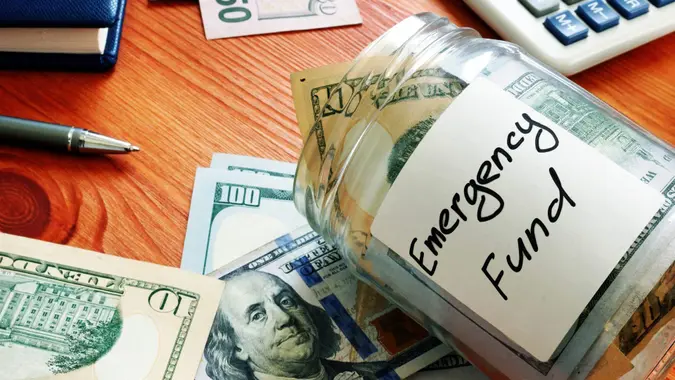8 Ways You Might Be Paying Too Much for Groceries

Commitment to Our Readers
GOBankingRates' editorial team is committed to bringing you unbiased reviews and information. We use data-driven methodologies to evaluate financial products and services - our reviews and ratings are not influenced by advertisers. You can read more about our editorial guidelines and our products and services review methodology.

20 Years
Helping You Live Richer

Reviewed
by Experts

Trusted by
Millions of Readers
Grocery shopping is a necessary (and often delicious) expense, but it can easily take a toll on your budget if you’re not careful. Many factors, such as impulse buys or purchasing out-of-season foods, can contribute to overspending on groceries. Because of this, it’s important to be mindful of your spending habits and develop strategies to cut down on unnecessary expenses.
Here’s how to know if you’re paying too much for groceries — and some tips on how to save money while still buying your favorite foods.
You’re Not Shopping With a Budget or a List
According to CouponBirds‘ financial expert Natalie Warb, a useful method for determining whether you are overspending on groceries is to shop with a predetermined list and budget. Warb recommends establishing a firm yet practical budget for essential items as a means of monitoring grocery expenses. This approach not only assists shoppers in managing their in-store expenditures, but it can also serve as an effective tool for detecting price hikes.
You’re Not Shopping Around
It quite literally pays to check different grocery stores to see who has the best deals on what you’re shopping for. Julie Ramhold, a consumer analyst at DealNews.com, suggests that Instacart members can use the platform to compare prices of items across various stores. Although most products on Instacart are pricier than they are in store, this technique can provide valuable insight into the varying costs of items at different retailers.
Some supermarkets also offer online shopping with in-person pickup or delivery options. By conducting research and observing lower prices at other stores for frequently purchased items, consumers can determine if they are overpaying.
You’re Not Checking Price Differences Between Generic and Name-Brands Items
This one’s a little tricky, and definitely something to look out for. “If a store has its own brand and the name-brand products are priced much higher than the generics in a way that seems unreasonable, then the odds are good you’re overpaying,” says Ramhold. “There’s a chance that depending on the size of the store and if it’s a chain, it could be artificially inflating the prices of name-brand products in order to make their own in-house brands more appealing.”
Your Shopping at an Expensive Store
Some stores are just pricier in general, says Ramhold. “Look at the selection of products. If you’re only seeing higher-end items or everything is labeled “organic” then you may be paying too much for groceries overall,” she shares. “A good grocery store is going to have products to fit a variety of budgets, but if you find yourself spending a ton of cash and not getting much for it, you’re definitely overpaying for whatever you’re buying.”
You’re Not Using Coupons or Rewards Programs
“I collect coupons from newspapers, apps and websites, and I make sure to use them wisely,” shares Amy Smith of AmyandRose, a website where she shares her shopping adventures, tips and tricks to help others achieve grocery-shopping nirvana. Not only that, many grocery stores have their own rewards programs that are worth signing up for.
You’re Getting Sucked In by Impulse Buys
According to Smith, a common way to overspend on groceries is by falling prey to impulse buys that lure consumers in with flashy displays and appealing packaging. However, Smith has discovered that such impulsive purchases frequently have a higher price tag than their actual value. To avoid overspending, Smith adheres strictly to a shopping list and resists the urge to purchase unnecessary items.
You’re Throwing Away Food
If you end up discarding food, you’re overspending on groceries. For instance, say you bought five pounds of spinach from Costco and only end up making a single salad. Not only is that wasteful, but it’s expensive. If you can, shop with recipes in mind and keep your fresh foods front and center in your fridge to ensure you don’t waste them.
You’re Not Embracing the Season
Not purchasing in-season foods could result in overspending on groceries. “As a grocery shopping connoisseur, I know seasonal produce is cheaper and fresher,” shares Smith. “I’ve become one with the seasons, adjusting my recipes to incorporate in-season fruits and veggies, ensuring I don’t overpay for out-of-season items.”
 Written by
Written by  Edited by
Edited by 

























